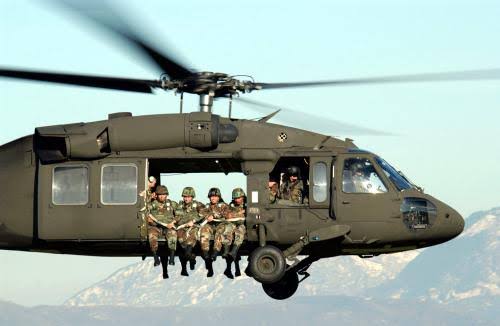UH 60 Helicopter: Advanced Avionics and Combat Solutions
UH 60 Helicopter: Advanced Avionics and Combat Solutions
Blog Article
The Duty of Aircraft fit International Transport and Trade Characteristics
The advancement of aircraft has indelibly changed worldwide transportation and profession characteristics, helping with unprecedented degrees of connectivity and efficiency. Via the facility of robust air freight networks, services can now browse worldwide markets with remarkable rate and agility, therefore redefining supply chain methods. This change is not without its challenges, as the air travel industry grapples with sustainability worries and regulatory stress. As we explore the diverse impacts of airplane on global profession, it is necessary to take into consideration exactly how these variables will form the future landscape of aviation and its function in the economy.

Evolution of Air Transportation
The development of air transport has actually been noted by considerable technical improvements and technologies that have actually changed the means people and goods move across the world. From the Wright bros' initial powered trip in 1903 to the advancement of supersonic jets, each turning point has emphasized the unrelenting pursuit of efficiency and speed in air travel.
The last part of the 20th century saw the development of commercial aviation as a viable setting of transport, characterized by the introduction of jet engines, which revolutionized air travel by considerably decreasing trip times. Furthermore, developments in navigating and communication modern technologies have actually enhanced functional effectiveness and safety and security, enabling even more facility flight routes and schedules. The surge of air freight in parallel with guest solutions has better emphasized the convenience of air travel. As we seek to the future, emerging technologies such as electrical and independent airplane pledge to redefine the air transportation landscape, guaranteeing ongoing advancement and adaptation to global needs.
Effect On Global Trade
Air transport has profoundly reshaped international profession by promoting the swift movement of items across huge ranges. This expedited logistics ability permits companies to react quickly to market needs, thus improving supply chain performance. The ability to deliver perishable items, high-value items, and time-sensitive items has actually opened brand-new markets and possibilities for different sectors, significantly affecting profession patterns.
Furthermore, the advancement of air freight networks has promoted globalization, making it possible for companies to source materials and items from various parts of the globe perfectly. This interconnectedness minimizes lead times and costs, allowing companies to continue to be affordable in an increasingly worldwide industry. In addition, air transportation plays a crucial role in ecommerce, where customer assumptions for rapid delivery have driven a surge sought after for air cargo solutions.
The effect of airplane on international profession includes the production of calculated profession routes, connecting regions and promoting worldwide partnerships. Nations that purchase air transport facilities typically experience improved financial growth and enhanced foreign direct financial investment. On the whole, the advancement of air transport has not just changed the logistics landscape yet has additionally become a vital component in the dynamics of global trade.

Financial Benefits of Aviation
A durable aeronautics market generates substantial economic advantages, adding to job creation, tourist, and general economic weblink development - uh 60. The air travel industry supports millions of tasks around the world, varying from straight employment in airlines and airports to indirect functions in sectors such as friendliness, transportation, and logistics. According to sector records, for every work in the air travel field, roughly 3.5 added work are developed in the wider economic situation
Tourism is a pivotal component of the economic advantages stemmed from aeronautics. Flight promotes worldwide tourist, enabling vacationers to check out varied destinations, which subsequently stimulates neighborhood economies. Nations that buy their air travel infrastructure commonly experience increased vacationer arrivals, leading to greater investing on services such as destinations, resorts, and restaurants.

Furthermore, aviation boosts international connectivity, allowing companies to access new markets and sources successfully. As a result, markets such as shopping and production benefit tremendously from reliable air transportation, more driving financial growth.
Difficulties Dealing With the Aviation Industry
Navigating an intricate landscape of governing, ecological, and economic challenges, the aviation sector encounters considerable obstacles that threaten its sustainability and growth. Rules bordering safety and safety are constantly evolving, demanding ongoing conformity and adjustment from manufacturers and airlines (uh 60). This can lead to enhanced functional expenses and source allocation that diminishes advancement and growth initiatives
Furthermore, environmental problems have actually become extremely important, with expanding scrutiny over carbon exhausts and sound pollution. The market is under stress to take on greener technologies and methods, which typically require considerable investment in research study and development. Stabilizing these environmental obligations with the demand for flight presents a significant challenge.
Financial fluctuations, such as increasing gas costs and geopolitical unpredictabilities, even more make complex the landscape. Airline companies regularly face volatile operating expenses and rising and fall traveler need, which can affect profitability and lasting planning. Labor lacks and ability gaps in important locations add one more layer of intricacy, impeding operational efficiency.
Eventually, attending to these multifaceted challenges is necessary for the aviation industry to preserve its crucial role in worldwide transport and profession, while ensuring resilience and versatility in a significantly competitive market.
Future Trends in Flight
Arising modern technologies and changing customer choices are positioned to improve the future of air traveling significantly. The integration of expert system and device learning is expected to improve operational effectiveness, enhance airport processes, and improve client service. Predictive analytics will certainly assist in extra exact need projecting, permitting airline companies to maximize trip timetables and rates versions.
Sustainability is becoming a vital chauffeur in flight, with additional resources the aviation industry increasingly concentrated on lowering carbon exhausts. Developments in airplane design, such as hybrid and electric propulsion systems, are being explored to fulfill ecological targets. The adoption of sustainable aeronautics gas (SAFs) is expected to play an important role in accomplishing net-zero exhausts by 2050.
Consumer choices are changing in the direction of personalized travel experiences. Airlines are spending in advanced information analytics to tailor services and improve client interaction, ensuring a more personalized trip from scheduling to arrival. In addition, the surge of remote job may cause enhanced need for leisure traveling, as individuals seek to incorporate job and vacation.
Final Thought
Finally, airplane considerably affect worldwide transportation and trade dynamics by helping with quick motion and boosting supply chain effectiveness. The advancement of air transportation has actually transformed worldwide profession, generating significant economic advantages while also providing obstacles that need critical administration. Future fads show an ongoing dependence on aeronautics for commerce, highlighting its integral function in globalization and economic advancement. The recurring adjustment of the aeronautics market will be vital for sustaining its contributions to the global economy.
The last component of the 20th century saw the development of commercial aviation as a practical setting of transportation, identified by the introduction of jet engines, which transformed air traveling by drastically lowering flight times. The increase of air cargo in parallel with traveler services has even more underscored the flexibility of air travel. Furthermore, air transportation plays a crucial duty in e-commerce, where customer expectations for rapid shipment have actually driven a surge in need for air products services.
On the whole, the advancement of air transportation has not only changed the logistics landscape however has additionally end up being an essential component in the dynamics of global profession.
Sustainability is coming to be a vital vehicle driver in air traveling, with the aviation market significantly concentrated on lowering website link carbon discharges.
Report this page